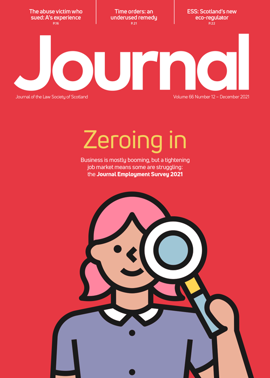Opinion: Amanda Masson
The Scottish Civil Justice Council consultation on virtual and in-person court hearings has now closed. The consultation sought views on draft rules about the conduct of civil hearings in the Court of Session and sheriff courts. It is fair to say that the proposed rules have evoked strong responses.
There is no doubt that the way we conduct litigation has changed drastically since the onset of the pandemic. The initial sense of chaos has abated, and to a large extent we have become used to conducting civil court hearings remotely.
A way of conducting court business which emerged as a response to a public health need is going to be adapted as part of the evolution of our modern justice system, whether we like it or not. Even the most vocal naysayers acknowledge that some degree of remote participation is inevitable.
The consultation recognises the need to consider effective participation in the justice system, maintaining the gravitas of the court, availability of technology and public safety.
It seems that the majority of court practitioners would prefer to get back into court without further ado. The Faculty of Advocates’ response to the consultation is worth reading. It sets out cogently and in stark terms the reasons for the Faculty’s opposition to the proposed new rules.
The paper itself anticipates the potential concerns around access to justice, the need to safeguard against potential contempt of court, public and media access, and the need for “justice to be seen to be done”. Yet it sets out numerous reasons why remote hearings may serve a modern justice system well.
It is important to observe that the proposed new rules are consistent with the thrust of the Scottish Government’s digital strategy. The paper A Changing Nation: How Scotland Will Thrive in a Digital World is thought provoking and relevant. It highlights the opportunities created by online working. It explores ways of addressing the problem of digital exclusion, including provision of devices, training, investment in strengthening broadband connections, and potential funding for access to digital services via third sector organisations. The proposed new rules on remote working also anticipate the issue of digital exclusion, and provide potential solutions in the form of exemptions to remote hearings.
Perhaps the fundamental question is whether we lawyers really want to live in a virtual reality. Just as there are concerns around how remote hearings can properly ensure access to justice for members of the public, so too are there concerns about what remote hearings mean for members of the profession. A virtual world can be a lonely place. Junior members of the profession have fewer opportunities to observe and learn from more experienced colleagues and to build a rapport with the bench. Some junior colleagues may not have a separate space in which to work at home, with no physical or psychological boundaries between home and work. The collegiate culture in which our profession thrives is diminished. Chats about challenging cases can be few and far between. Many miss the supportive framework that going to court provided.
Arguably, we do need to broaden our horizons. The system of litigation we worked with prior to the outbreak of the pandemic was not perfect, by any means. Travel to and from court, and waiting time, is inefficient and costly for both solicitors and clients. Heavy footfall in public buildings also poses a public health risk.
The proposed new rules do not seek to abolish in-person civil court hearings altogether. Exemptions are explored. There are three possibilities: (1) in-person hearings; (2) hearings by electronic means; or (3) a hybrid of the two.
Many solicitors have opted for a hybrid model of working. The court system may come to work in a similar way. Perhaps we need to strive for the best of both worlds in the conduct of civil litigation, just as many of us have in our working practices. Some of the arguments for remote working, such as better work-life balance, may seem relatively trite, but fundamentally they strike at the heart of individual and collective wellbeing. Protection of the wellbeing of the profession can only be a positive thing.
The draft rules do contain exceptions which can be invoked where an in-person hearing would be more appropriate than a remote hearing. To my mind, the draft rules anticipate and deal with the concerns around access to justice. It is for us to adapt and find ways to be able to continue to offer support, supervision and training within the court arena just as we have had to do in our offices.
Change can be daunting, but with challenges come opportunities. As someone once put it: “The secret of change is to focus all of your energy not on fighting the old, but on building the new”.
Regulars
Perspectives
Features
Briefings
- Criminal court: OLRS – life means life
- Corporate: Will a deal impact on national security?
- Intellectual property: IP and AI – the latest
- Agriculture: Securing successor crofting tenant status
- Succession: Back of an envelope – testamentary intent?
- Scottish Solicitors' Discipline Tribunal
- Data protection: Google off the hook
- Property: Beautifully presented tedium
- In-house: Lawyers in uniform
In practice
- Your Law Society of Scotland Council members
- Legal services regulation reform – have your say
- The Word of Gold: Whither goest thou?
- Coaching: help in a fast changing world
- The earlier the better
- Family mediation accreditation: a view from the panel
- The Eternal Optimist: Just to say thanks…
- Appreciation: Albert Vincent Sheehan
- Ask Ash: A broken work circle







